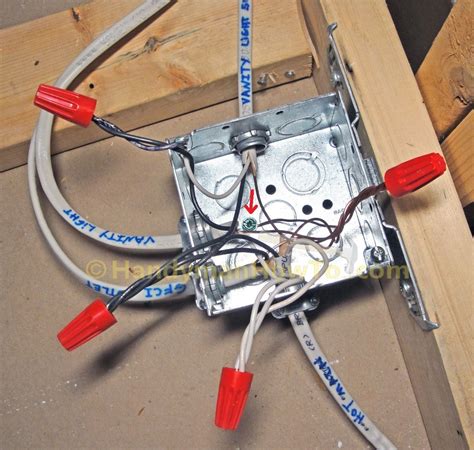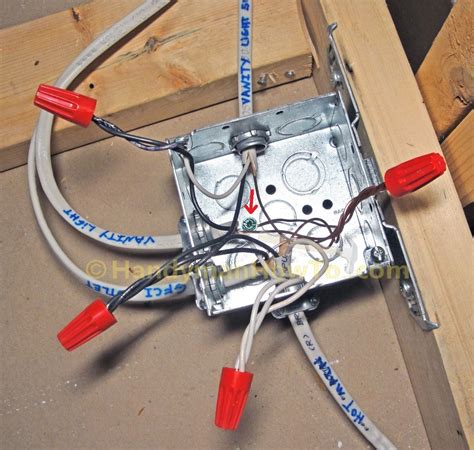advantages of junction box One of the key benefits of junction boxes is their ability to contain potential electrical hazards. The box acts as a barrier between the electrical connections and the surrounding environment, preventing accidental contact or damage to . Generally, sheet metal workers fabricate and install metal products using saws, lasers, shears, presses and computers. This sort of rigorous labor includes a high risk of illness and.
0 · where are junction boxes located
1 · when to use junction box
2 · residential junction box
3 · junction box vs receptacle
4 · junction box for electrical wiring
5 · function of junction box
6 · different types of junction boxes
7 · are junction boxes safe
I'm planning to rebuild the mattress with a latex topper, but am thinking about the best option for between the mattress and box spring (I would rather not buy a new foundation and add more to the landfill).
We find multiple types of junction boxes with their properties and advantages. For this reason, we categorize these electrical junction box types based on their features and applications. We will discuss each type in the .Junction boxes serve several important functions in electrical systems. Here are their primary purposes: 1. Protection of Electrical Connections. Junction boxes enclose and protect electrical connections from physical damage, dust, .
One of the key advantages of metal junction boxes is their ability to provide grounding. The metal construction allows for a reliable grounding connection, which is crucial . Plastic junction boxes are the standard choices for non-metallic cable. Polycase offers both metallic and plastic junction box options, and we’ll look at some top options for both .One of the key benefits of junction boxes is their ability to contain potential electrical hazards. The box acts as a barrier between the electrical connections and the surrounding environment, preventing accidental contact or damage to .
Junction boxes protect the wire covering, remove dirt and dust and prevent moisture from entering the box. They also prevent ignition of combustible materials in the event of arcing due to a loose connection or short circuit. . A junction box is not a special type of box but any standard electrical box used to enclose wire splices. The most commonly used box for junctions is a 4-inch square box (either metal or strong plastic), which offers .Junction boxes have been used for ages to ensure that safety is upheld when it comes to dealing with electricity. Junction boxes are ideally electrical enclosures that are made using metal or plastic that are used to house outdoor wiring that .By definition, a junction box is an enclosure made of plastic or metal that houses the electrical wiring connections, protecting them from the elements and from vandalism.
A junction box – also known as an ‘electrical box’, ‘jbox’, ‘or ‘terminal box’ – is a protective box where wires are interconnected. Junction boxes are often built into the plaster of a wall, in the ceiling, or within concrete. We find multiple types of junction boxes with their properties and advantages. For this reason, we categorize these electrical junction box types based on their features and applications. We will discuss each type in the following section to help you spot the best type for your requirements.
Junction boxes serve several important functions in electrical systems. Here are their primary purposes: 1. Protection of Electrical Connections. Junction boxes enclose and protect electrical connections from physical damage, dust, moisture, and other environmental hazards. One of the key advantages of metal junction boxes is their ability to provide grounding. The metal construction allows for a reliable grounding connection, which is crucial for electrical safety. Additionally, metal boxes offer better fire resistance compared to their plastic counterparts, making them suitable for installations that require . Plastic junction boxes are the standard choices for non-metallic cable. Polycase offers both metallic and plastic junction box options, and we’ll look at some top options for both later on. The size of the junction box itself is also a relevant factor in making your choice.
One of the key benefits of junction boxes is their ability to contain potential electrical hazards. The box acts as a barrier between the electrical connections and the surrounding environment, preventing accidental contact or damage to the wires. Junction boxes protect the wire covering, remove dirt and dust and prevent moisture from entering the box. They also prevent ignition of combustible materials in the event of arcing due to a loose connection or short circuit. prevents. Almost every modern electrical system requires a junction box or junction box.

A junction box is not a special type of box but any standard electrical box used to enclose wire splices. The most commonly used box for junctions is a 4-inch square box (either metal or strong plastic), which offers ample space for making wire connections with multiple wires or .Junction boxes have been used for ages to ensure that safety is upheld when it comes to dealing with electricity. Junction boxes are ideally electrical enclosures that are made using metal or plastic that are used to house outdoor wiring that is derived from .By definition, a junction box is an enclosure made of plastic or metal that houses the electrical wiring connections, protecting them from the elements and from vandalism.
where are junction boxes located
A junction box – also known as an ‘electrical box’, ‘jbox’, ‘or ‘terminal box’ – is a protective box where wires are interconnected. Junction boxes are often built into the plaster of a wall, in the ceiling, or within concrete. We find multiple types of junction boxes with their properties and advantages. For this reason, we categorize these electrical junction box types based on their features and applications. We will discuss each type in the following section to help you spot the best type for your requirements.
primitive metal saltbox house shelf sitter
Junction boxes serve several important functions in electrical systems. Here are their primary purposes: 1. Protection of Electrical Connections. Junction boxes enclose and protect electrical connections from physical damage, dust, moisture, and other environmental hazards. One of the key advantages of metal junction boxes is their ability to provide grounding. The metal construction allows for a reliable grounding connection, which is crucial for electrical safety. Additionally, metal boxes offer better fire resistance compared to their plastic counterparts, making them suitable for installations that require .
Plastic junction boxes are the standard choices for non-metallic cable. Polycase offers both metallic and plastic junction box options, and we’ll look at some top options for both later on. The size of the junction box itself is also a relevant factor in making your choice.One of the key benefits of junction boxes is their ability to contain potential electrical hazards. The box acts as a barrier between the electrical connections and the surrounding environment, preventing accidental contact or damage to the wires. Junction boxes protect the wire covering, remove dirt and dust and prevent moisture from entering the box. They also prevent ignition of combustible materials in the event of arcing due to a loose connection or short circuit. prevents. Almost every modern electrical system requires a junction box or junction box. A junction box is not a special type of box but any standard electrical box used to enclose wire splices. The most commonly used box for junctions is a 4-inch square box (either metal or strong plastic), which offers ample space for making wire connections with multiple wires or .
Junction boxes have been used for ages to ensure that safety is upheld when it comes to dealing with electricity. Junction boxes are ideally electrical enclosures that are made using metal or plastic that are used to house outdoor wiring that is derived from .
when to use junction box

residential junction box
The most common electrical box screw size is 6-32 machine screw. However, for many applications, 6-32 is too light duty, so we use an 8-32 or even a 10-32 instead. The thread pitch, however, is always 32.
advantages of junction box|junction box vs receptacle